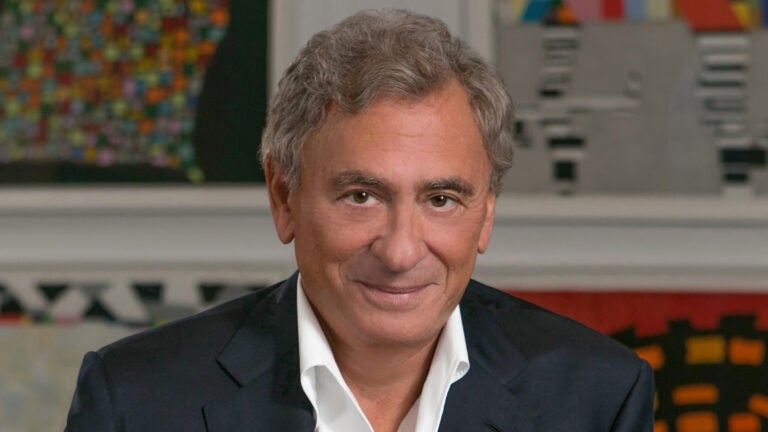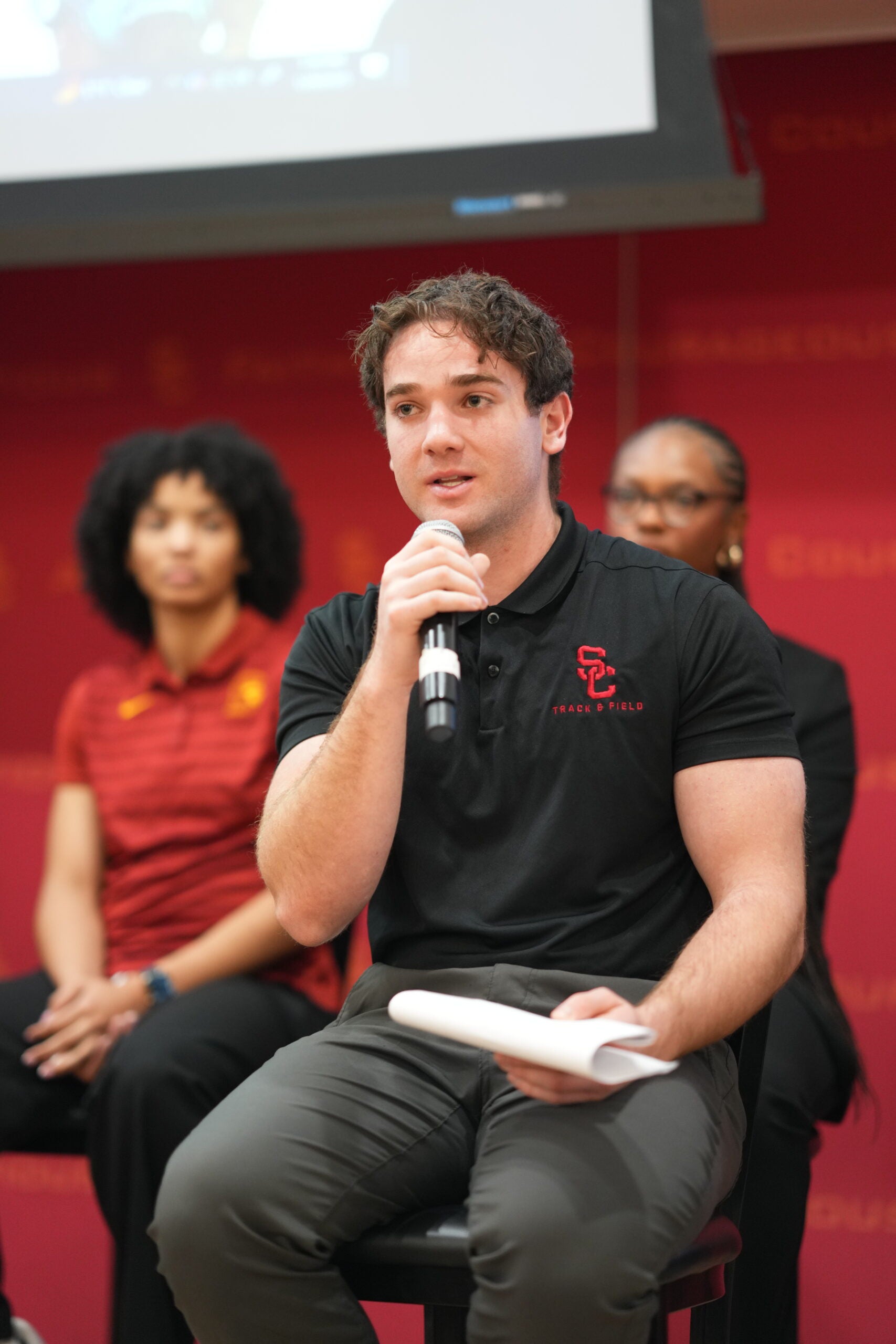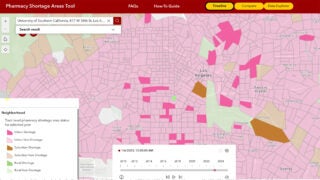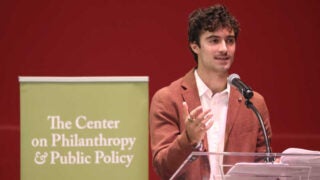
Mickey Shapiro is a member of USC Shoah Foundation’s board of councilors and executive committee. (Photo/John Lieberman)
Longtime Holocaust remembrance leader bolsters USC Shoah Foundation’s efforts with $30 million gift
Mickey Shapiro’s donation renames the foundation’s headquarters and strengthens its mission to continue sharing the stories and lessons of the Holocaust for generations to come.
For the past 30 years, USC Shoah Foundation has collected, preserved and shared the testimonies of Holocaust survivors. On Tuesday, USC honored Mickey Shapiro, a longtime leader in the preservation of Holocaust memory and a strong advocate against antisemitism, for his recent $30 million gift to the foundation that will help preserve the lessons of the Holocaust for the next 30 years and beyond.
The university celebrated Shapiro’s gift at an event outside Leavey Library on USC’s University Park Campus, the home of the USC Shoah Foundation. As part of the gift, the foundation’s space at the library has been renamed the Mickey Shapiro Headquarters of the USC Shoah Foundation.
Shapiro, a member of the Shoah Foundation’s Board of Councilors and executive committee, hopes the gift will give future generations access to the indispensable resources and learning materials the foundation provides.
“The USC Shoah Foundation’s staff, its board, its scholars and especially the survivors and their families welcomed me into this work and made me feel part of something truly meaningful,” Shapiro said before the event. “Over the last 20 years, its mission and people have become a part of me. The world needs to learn from the Holocaust, and that will always be true, which is why this gift is so important.”
USC President Carol Folt praised Shapiro and the gift, citing his indelible impact on Holocaust remembrance.
“Today we’re going to etch into the very fabric of our university here a gift that will help ensure the preservation and protection of the USC Shoah Foundation,” Folt said in front of the crowd at the event. “Mickey, this endowment is going to fuel our commitment to remembrance. It fuels our commitment to education and an unwavering pursuit of a world free of hate. It will help us in so many ways to preserve a cherished collection for all time.”

Robert Williams, CEO of the foundation, noted that the headquarters now named for Shapiro “will remind every student, every professor, every visitor who walks through our doors that memory must lead moral action, to truth, to respect, and to the fact that the Holocaust reaches beyond the confines of the past and shapes our lives.”
Shapiro, who sat surrounded by his family during the event, said he also hopes the gift will spur others to donate to the foundation to ensure that its “critically important work continues for the next 30 years, and that as an organization, we are able to address some of the most pressing issues we face, including the rise of antisemitism.”
The gift will be used toward general operating funds and the foundation’s endowment, which sponsors crucial research and initiatives across the globe while ensuring that the organization remains flexible enough to adapt to the challenges of the moment. Some of the funds will also go toward the ongoing collection and preservation of thousands of testimonies around the world that are at risk of degrading and disappearing from public use.
An overwhelming response
When celebrated filmmaker Steven Spielberg established the foundation on the backlot of Universal Studios in 1994, its primary goal was to collect testimonies from survivors and witnesses of the Holocaust. The need for the preservation of these memories became apparent immediately: Within five years, the collection had already amassed 50,000 testimonies. That response led foundation leaders to realize that these stories needed to be preserved and used for the purposes of education and research to preserve the memories of the survivors who trusted them with their testimonies.
To that end, Spielberg and his team approached USC in 2006 to ask if the university would not only provide a permanent home for the collection but also create the structures necessary to achieve the foundation’s educational and research goals. Since then, the foundation has expanded in several directions, including the collection of testimonies from other genocides.
While the foundation has in the past focused on the development of technology to reach new audiences, Holocaust expert Williams was hired as CEO and Finci-Viterbi Chair more than two years ago to execute the organization’s current focus of scholarship, academic production and the training of adult audiences.

One example of the latter includes the Leadership Summit, through which the foundation has for the past three years sponsored a program for Trojan student-athletes to visit Poland, witness historic sites of the Holocaust firsthand and connect with specialists and academics.
“When you look at USC student-athletes, you truly have the cream of the crop,” said Williams, who is also the UNESCO Chair on Antisemitism and Holocaust Research and the advisor to the International Holocaust Remembrance Alliance. “There’s a strong opportunity for USC athletes to move on to the professional levels and to be willing to speak out against all forms of hate, including antisemitism.”
The foundation also launched the Countering Antisemitism Laboratory on the USC Capital Campus to address antisemitism around the world, including the collection of testimonies from survivors of antisemitic violence since the end of the Holocaust, hoping to create the largest such resource in the world. The testimonies will be freely available online and used for research and to educate diverse audiences — such as journalists, civil servants, college students and business leaders — on how to better recognize and resist antisemitism. The lab will also feature, among other initiatives, an Online Hate Analysis, which will leverage artificial intelligence, qualitative and quantitative methodologies and other technologies to understand the sources, evolution and spread of online hate speech.
Shapiro’s gift will help maintain the sustainability of these programs and other USC Shoah Foundation initiatives around the world geared toward education, research and the preservation of irreplaceable testimonies.
“Whether it’s through the Holocaust education that we’re launching here or the continued work of the USC Shoah Foundation here on the USC campuses or through all of the other indirect work that he’s behind, I can honestly say that Mickey Shapiro’s work will reach millions of students now and into the future,” Williams said. “That is something that no textbook and no single organization can lay claim to.”
A global institution for a global cause
Williams explained that while the East Coast has a very robust infrastructure for Holocaust memory, education and research, the same can’t be said for the West Coast. “That’s important because these are histories that have national and global implications,” he said. “The USC Shoah Foundation is one of the top five Holocaust institutions in the world both in size and in scope. Having one of the strongest such institutions in the world at a major university that’s committed to these issues — you cannot downplay the significance of that.”
He pointed out the importance of USC’s Capital Campus in Washington, D.C., in strengthening the foundation’s international connections and giving global reach to its collections and other resources. The foundation has already held two major programs out of the Capital Campus this year, with the German and Polish governments, on Holocaust issues.
“Mickey’s gift really does ensure that the memories of Holocaust survivors, like his mother, can help shape our understanding of a better world for the future,” Williams said.
For Shapiro, USC has been an ideal steward of the foundation’s mission and its archives. “For the last nearly 20 years since the Shoah Foundation became a part of the university, they have ensured that the foundation has been able to preserve the testimonies at the highest quality, and helped ensure that its academic, research and educational programs continued to grow and create impact,” he said.
A lifetime shaped by stories
Born in a Displaced Persons camp in Germany shortly after World War II, Shapiro immigrated to the United States with his family knowing the road wouldn’t be easy. His father, Asa Shapiro, had just $8 in his pocket when they arrived.
Because he grew up speaking Yiddish and German, Shapiro was able to listen along as a young boy when fellow survivors visited his parents and sat around the kitchen table sharing stories of horror and perseverance.
“Their courage and the courage of every survivor who shared their testimony have been my guiding light,” Shapiro said.
Although his mother, Sara, was able to preserve her story with the foundation in 2012, Shapiro emphasized that many important testimonies from that time have yet to be told and preserved. Because of this, he feels a deep sense of responsibility to keep those memories alive.
“For those who know me well, they’ve heard me say, ‘If not me, then who? If not now, then when?’” Shapiro said. “It is important that we all ask ourselves that question and do what we can to ensure the safety and sustainability of the USC Shoah Foundation well into the future.”
A singular legacy
Shapiro and his family have been generous and deeply involved supporters of the foundation for nearly 20 years. In 2015, he endowed the Sara and Asa Shapiro Annual Holocaust Testimony Scholar and Lecture Fund at USC’s Center for Advanced Genocide Research. The prestigious scholarship — a one-month residency — gives scholars the opportunity to use the foundation’s private and public Holocaust and genocide resources, including its Visual History Archive that contains more than 61,000 testimonies from witnesses of the Holocaust and other genocides, including the Armenian and Rwandan genocides. Shapiro also endowed the Sara and Asa Shapiro Visitor’s Lounge at the foundation’s headquarters.
In his closing remarks at Tuesday’s event, Williams spoke again to Shapiro’s importance to the future growth and preservation of the testimonial lessons the foundation preserves.
“Your service on our board has helped us grow in extraordinary ways in the past two years,” he said, “and your generosity has strengthened our ability to safeguard Holocaust memory and counter antisemitism in all of its forms. You’ve always understood what too many ignore: Remembrance is an active commitment to truth.”
Shapiro hopes his philanthropy with the foundation inspires others to support its mission as well. That mission includes trying to find at least 100,000 testimonies globally that were taken on mediums such as VHS tapes that are disintegrating and at risk of being lost forever. The foundation is also working with key partner institutions to secure old tapes from areas such as the former Yugoslavia and promoting the work of local initiatives in Ukraine and Belarus to track down testimonies captured on cassettes that can’t be easily accessed.
“Every day, the USC Shoah Foundation is not only preserving memory but shaping a better future for mankind,” Shapiro said. “The work of the foundation has been and continues to be critically important to preserving Holocaust memory, fighting Holocaust denial and distortion, and ensuring these life histories are preserved for future generations.”
To support the USC Shoah Foundation’s work to fight antisemitism, hatred, dehumanization and genocide, contact Andrea Waldron by email or call 213-700-7167.



